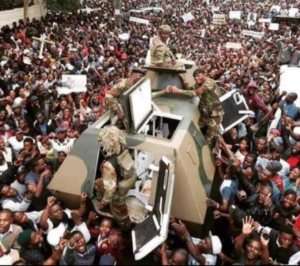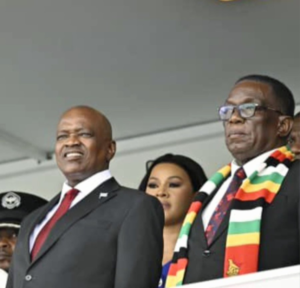ZANU PF POWER SHIFT: MNNANGAGWA ALLIES DEFEATED IN SHOCK WAR VETERANS CONGRESS

In a major political shift within Zimbabwe’s ruling party Zanu PF, two key allies of President Emmerson Mnangagwa, Christopher Mutsvangwa and Victor Matemadanda, suffered a surprising defeat in the Zimbabwe National Liberation War Veterans Association elective congress held in Gweru yesterday. This election result has shaken the balance of power in the party, especially since Mutsvangwa and Matemadanda were known as close allies of Mnangagwa.
Mutsvangwa, who was previously elected as the leader of the war veterans in 2013 during a congress in Masvingo, faced a massive defeat in the recent congress. He was beaten by Cephas Ncube, who hails from Bulawayo province. The congress, which took place at the Zanu PF Convention Centre in the Midlands capital, showed the war veterans were ready for change.
War veterans are an important political group within Zanu PF. However, they have faced challenges in holding their elective congress. They even skipped holding one in 2018. So, when the congress finally took place, the results were dramatic, especially since the defeat occurred right in Mnangagwa’s political stronghold.
Ncube received 294 votes, while Mutsvangwa, who was considered a major political figure, only managed to get 11 votes, marking his extreme unpopularity among the war veterans. Ncube is now the new leader of the war veterans. Matemadanda, another loyalist of Mnangagwa, did not fare much better. He came in third place with only 75 votes. Albert Ncube from Matabeleland North came in second place with 90 votes. Meanwhile, Shorai Nyamangondo was elected vice chairperson unopposed.
Other elected members of the war veterans’ executive include Joel Murerengwa (Secretary-General), Thomas Manyima (Legal Affairs), Vincent Chinone (Transport), Section Ncube (Finance), Sanik Nguni (Security), Cde Nyembesi Togara (Women Affairs), and Samuel Parirenyatwa (Political Commissar). Interestingly, there are now three people with the surname Ncube in the new executive.
The three Ncubes are aligned with Vice President Constantino Chiwenga, signaling a significant shift in the party. Mutsvangwa and Matemadanda, on the other hand, were known as allies of Mnangagwa, though they had been sidelined in recent times due to internal party conflicts.
When Mnangagwa rose to power in 2017, Mutsvangwa played an important role as his adviser. In his second administration, Mutsvangwa served as the Minister of War Veterans. However, his fortunes began to decline. In 2018, he was removed from his role as an adviser. Earlier this year, in February, he was also fired from his position as the Minister of War Veterans.
Matemadanda, who is currently Zimbabwe’s ambassador to Mozambique, also faced setbacks. He was the outgoing Secretary-General of the war veterans and previously held the position of Zanu PF’s political commissar. His defeat in the recent congress was another blow to Mnangagwa’s camp.
The defeat of Mutsvangwa and Matemadanda is significant, especially with Zanu PF’s annual conference just around the corner, scheduled for October 22 in Bulawayo. The results of the war veterans’ election strengthen Chiwenga’s position within the party, particularly in the war veterans’ constituency, which is an important part of Zanu PF’s support base.
Mnangagwa and Chiwenga are currently locked in a fierce power struggle over the future leadership of Zanu PF. Both are seeking to gain control over the state’s power structures. This congress result tips the balance of power towards Chiwenga, who now has more influence among the war veterans.
There are rumors that Mnangagwa is looking to extend his rule beyond the constitutional second term limit, which ends in 2028. Although Mnangagwa has denied these rumors, there is speculation that he wants to stay in power until 2030. Chiwenga and his faction are strongly opposed to Mnangagwa extending his rule beyond 2028, creating tension within the party.
Mnangagwa’s rule, since the departure of the late former president Robert Mugabe, has not brought much improvement to Zimbabwe. Many hoped for a change, but Mnangagwa has largely continued Mugabe’s policies, offering little of the fresh start the country so desperately needed.



